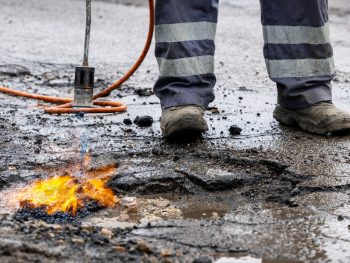Warning for more potholes as repair bill to fix crumbling roads rises to £16.3bn
More than half of local roads in England and Wales have less than 15 years’ structural life left as the bill to fix the backlog of repairs hits a record high of £16.3bn.

The report finds that 11% of local roads are already in poor condition and are likely to require maintenance in the next 12 months alone
The figures, taken from the 2024 Annual Local Authority Road Maintenance (ALARM) report published by the Asphalt Industry Alliance, show the critical state of local roads in England and Wales – and the need for a long-term funding solution.
The backlog of repairs now stands at almost double the extra £8.3bn that the Government has promised over the next 11 years from diverted HS2 funding.
The findings, which relate to the 2023/24 financial year, show that less than half (47%) of all local roads are reported to be in good structural condition, meaning the remaining 107,000 miles (53%) could continue to deteriorate to the point of needing to be rebuilt within the next 15 years without appropriate maintenance measures taking place.
Surface conditions are also reported to have declined, despite a 40% increase in the number of potholes filled over the last 12 months adding to the existing patchwork of previous repairs. Some two million potholes have been filled in over the last year at cost of £143.5m has been spent filling in 2 million potholes over the last 12 months.
As it stands, roads are only resurfaced on average once every 80 years.
Although local authority highway teams have reported an overall increase in budgets, rising costs due to inflation meant that major resurfacing schemes, designed to prevent more expensive repairs, have had to be delayed or scaled back. This has been compounded by the increasing frequency of extreme weather events, which together are accelerating the rate at which the network is deteriorating.
Rick Green, chair of the Asphalt Industry Alliance, said: “It’s clear that there is still a mountain to climb when it comes to improving the condition of our local roads, which are a key asset on which we all rely, every day.
“The Government has recognised that fixing our roads is about more than filling in potholes with its announcement of the additional Network North funding in England. But, while the Transport Secretary stated that this additional £8.3bn over 11 years is enough to resurface 5,000 miles of local roads, this equates to just 2.5% of the network – or less than 0.25% per year.
“Unfortunately, it will do little to address the scale of the issue with ALARM findings reporting that 11% of local roads are already in poor condition and likely to require maintenance in the next 12 months alone.
“That said, English authorities would be in an even worse position without this additional funding, so we sincerely hope that this promise is delivered on and that the Welsh Government honours its commitments to prioritising highway maintenance.”
“We need to reach the point where local authority highway engineers are able to plan and proactively carry out maintenance work in the most timely and efficient way to the greatest benefit of all road users – rather than just having enough money to address immediate and urgent repairs.”
The Local Government Association said the report shows the huge challenge facing councils in maintaining the local roads network.
Transport spokesperson, councillor Darren Rodwell commented: “Only with a long-term plan with year-on-year funding certainty can we begin to reverse this decline, bring our roads up to scratch and save both lives and costs for all roads users.”
And RAC head of policy Simon Williams said: “With this report showing an estimated 107,000 miles of roads are fast reaching the end of their lives, the scale of the problem now facing councils is truly gargantuan. The fact government data shows road maintenance is actually declining at a time when the precise opposite is needed, is even further evidence that councils don’t have the funding they need to look after these most important assets.
“The status quo is not sustainable. The longer the Government fails to grasp this reality, the bigger the eventual cost to the public purse. Only a commitment to introducing ring-fenced roads funding for councils will get them out of this dire mess. Without it, our roads will only get worse.”
AA breakdown data shows that 2023 was the worst year for potholes for five years.
AA president, Edmund King said: “The latest ALARM report shows just how much is needed to simply get our roads up to standard.
“Arguably the road network is a local council’s biggest asset, but not enough planned investment and repairs are being made to make streets safer and smoother for drivers and those on two wheels. Resurfacing occurs on average once every 80 years – making it a once-in-a-lifetime event.”
Now in its 29th year, the ALARM survey 2024 was completed by 72% of authorities responsible for roads in England, London and Wales and was carried out between December 2023 and February 2024.
A Department for Transport spokesperson said: “We’re taking decisive action to resurface roads and fix potholes by investing an extra £8.3bn of reallocated HS2 funding, the biggest ever funding increase for local road improvements and enough to resurface over 5,000 miles of roads across the country.
“In addition, we have made £150m available for local authorities right now meaning funding for most authorities has increased by almost a third compared to last year, with a further £150m to follow in the coming financial year.”
To access the ALARM survey, please click here.












